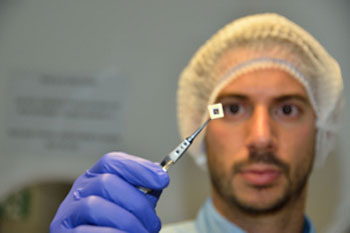| Posted: Aug 20, 2014 |
Entrepreneurial graphene scientist sets up a standards service
|
|
(Nanowerk News) Antonios Oikonomou is the winner of the Eli and Britt Harari Graphene Enterprise Award 2014 for his business enterprise; Graphene Characterisation and Standardisation Services (GCSS).
|
 |
| Antonios with graphene samples in the lab
|
|
Graphene, first isolated from graphite at The University of Manchester in 2004, comes in a large number of different forms and can have varying levels of quality. A major challenge for researchers and commercial users is verifying samples and how they can be used in developing applications.
|
|
GCSS will offer advanced graphene characterisation, certification and standardisation services which aim to use in-house expertise at The National Graphene Institute at The University of Manchester to develop the global standards of graphene quality. This aims to establish benchmark materials which can develop into standards that can be adopted by the rest of the industry.
|
|
Additionally, working with the standards bodies, industry and other research centres, GCSS aims to design new characterisation instruments that will bring the quality of lab equipment to an industrial level by improving the speed of measurement and establishing quality control in manufacturing processes.
|
|
The Eli and Britt Harari Graphene Enterprise Award is run in association with Sir Andre Geim, who together with Sir Kostya Novoselov won the Nobel Prize for Physics in 2010 for the isolation of graphene. The £50,000 award aims to encourage the development of new graphene enterprises from budding entrepreneurs across the University’s undergraduate, postgraduate and post-doctoral researcher communities, as well as recently-graduated alumni of the University.
|
|
Antonios, 32, who recently completed his PhD at The University of Manchester, said: “A major barrier for the commercialisation of emerging technologies, like graphene and other 2D materials, is the lack of quality standards across the industry.
|
|
“Through the implementation of various strategies, we want to guarantee that each batch of raw material manufactured will meet the quality and consistency that the downstream users require to develop innovative products.
|
|
“The award does not only provide the vital seed funding at this important stage, but also enables access to a number of important services throughout The University of Manchester.”
|
|
Professor Luke Georgiou, Vice-President of Research and Chair of the judging panel, said: “Antonios’ proposal meets a key requirement in the emerging graphene market, as many customers are unsure about the quality of graphene and 2D material samples they purchase from various sources, or for what applications they can be used.
|
|
|
|
“Establishing a standards centre on the University campus, the home of graphene, reinforces the University’s standing as the definitive voice of graphene in the world.”
|
|
The award is co-funded by the North American Foundation for The University of Manchester through the support of one of the University’s former physics students Dr Eli Harari (founder of SanDisk Corp), his wife Britt and the UK Government’s Higher Education Innovation Fund.
|
|
Applications were judged on the strength of their business plans to develop a new graphene-related business. The £50,000 prize will help to take the first steps towards realising the GCSS business plan. The award helps recognise the role that high-level, flexible early-stage financial support can play in the successful development of a business, targeting the full commercialisation of a product or technology related to research in graphene.
|
|
Chris Cox, Director of Development and Alumni Relations, said “It is thanks to work of the North American Foundation for The University of Manchester, that such a visionary business case can be made a reality. This is a great example of philanthropy extending the reach of what is possible across campus, and opening up new avenues.
|
|
“We hope that the award will become a major feature in the graphene landscape at the University for years to come.”
|

